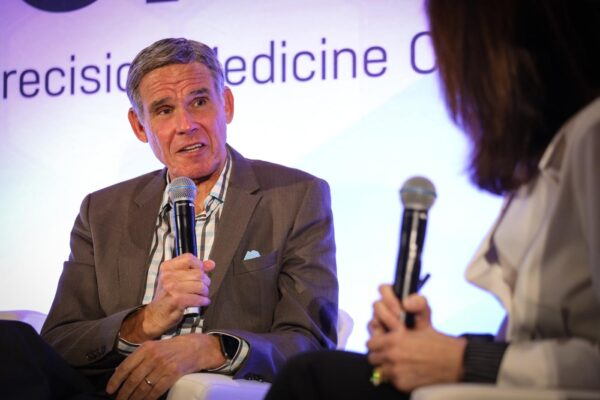
SAN DIEGO—Eric Topol, MD, renowned cardiologist and Director of the Scripps Research Translational Institute, believes that the use of artificial intelligence (AI) will be “the biggest transformation in the history of medicine.” As a keynote speaker at the 31st annual Precision Med TRI-CON meeting, hosted by Cambridge Healthtech Institute, Topol cited the launch of ChatGPT as the hallmark of a new phase of generative AI applications.
Topol is one of the top 10 most cited researchers in the world with over 1,300 peer review articles and more than 300,000 citations. His data filled blog, Ground Truths, has over 94,000 subscribers.
In her introduction of Topol for this keynote fireside chat, Mara G. Aspinall, partner at Illumina Ventures, professor of practice at Arizona State University, and moderator for the discussion, described the cardiologist as “not just a thought leader,” but also the “the Jedi Master of digital medicine, the Gandalf of genomics, and the Dumbledore of data-driven healthcare.”
In contrast to brute-force approaches, such as mass screening for disease, personalized medicine aims to build treatments by understanding the uniqueness of an individual. AI tools now provide the ability to take all the data layers of an individual human, including but not limited to genomics, electronic health records, and images, to reboot approaches for treating cancer, anticipating neurodegenerative diseases, partition risk for cardiovascular and metabolic diseases, and more.
“We send women for mammograms when they hit age 40…88% of women will never have breast cancer in their life. Why are we doing this? We now have all these false positives and false negatives, and this goes across all of cancer screening,” Topol said.
For over a decade, Topol has urged colleagues to pursue an alternative screening approach using polygenic risk scores, a sentiment he reiterated in a recent interview with Doug Flora, MD, Editor in Chief of AI in Precision Oncology. These scores can assist multi-modal AI tools to better partition at-risk populations and allocate resources, are attainable at low cost, and have been validated in tens of millions of people for many common diseases.
Topol also emphasized that the combination of AI with the plethora of data, from polygenic risk scores, gut microbiome data, to “organ clocks,” which evaluate the age of individual organs instead of the age of the person, can further facilitate the field’s ability to predict and address neurological diseases with longer time scales, such as Alzheimer’s.
In addition to diagnostics, AI tools for natural language can facilitate the documentation of doctor’s visits by recording a verbal dictation of the physical exam and the clinician’s conversation with the patient. These digital notes can remind the patient of the clinician’s recommendations, and lead to automated follow-up steps, including scheduling next appointments, lab tests, prescription pre-authorizations, and more. Topol highlights that this tool would save an average of three hours per day spent on data entry.
“Five years ago, when I wrote [my book], Deep Medicine, I said, the greatest gift of AI would be a gift of time,” said Topol.
These digitized notes surprised Topol with another advantage — human empathy.
“These notes will tell the doctor, why did you interrupt Mrs. Jones after nine seconds? If you ask for coaching, [the AI] will tell [the doctor how they] didn’t show any sympathy or let the patient express their concern. It’s promoting empathy like we’ve not seen before,” Topol exclaimed.
Topol looks forward to the medical educational system placing more emphasis on communication and interpersonal skills, noting that the future “no longer needs brainiacs,” but rather must select for people who want to be coached as humans.
Topol himself has tried these AI tools for note-taking in a pilot program and mentioned that a handful of medical centers have already adopted the technology. However, wide adoption by the entire medical system has yet to come.
Augmented intelligence
While AI’s proof points are “coming fast,” the medical field is still slow to foster change. As a case study, Topol noted that telemedicine, a tool that had existed for many years, only entered everyday use after the world underwent crisis circumstances during the COVID-19 pandemic.
“The biggest mistake that I’ve made over the years is expecting [change] to happen quicker than it ever does. It’s a real problem because the medical community is ultra conservative and not just resistant to change, but also education in a new field,” stated Topol.
Indeed, one main bottleneck slowing down the adoption of AI lies at the educational level. When asked whether medical schools do an effective job covering genomics, personalized medicine, and now AI, Topol answered, “none of the above,” and noted that AI is nearly non-existent in the medical school curriculum.
Topol also reiterated that data representation concerns must continue to be at the forefront when supporting these AI technologies.
“We must work to not only reduce bias to as close as zero as possible because of our cultural embedded mirror qualities, but also ensure AI supports people who have less access and representation in the medical system,” Topol said.
The session closed with concerns regarding data privacy and security, such as the intersection between documentation of disease-associated mutations and considerations for disability and life insurance. While Topol concurred that such concerns will require ongoing developments across law and regulation, he also reiterated that the overall good of these AI technologies should not be overlooked.
“Today, we have so many people dying of sepsis, when they should be diagnosed extremely early. There are AI tools now that are getting much better for [prediction]. There are so many ways where we can put a dent in the causes of death and morbidity,” emphasized Topol.
One message remains clear, the humanity of clinicians is crucial. The field calls for augmented intelligence, in which AI tools supplement medical knowledge, experiences, and relationships. Time will tell whether the humans of medicine will warm up to machines.
Fay Lin, PhD, is senior editor for GEN Biotechnology.













